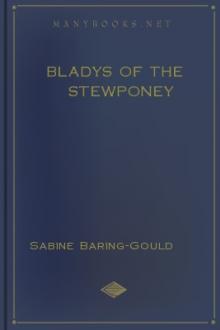The Broom-Squire - Sabine Baring-Gould (life books to read .txt) 📗

- Author: Sabine Baring-Gould
Book online «The Broom-Squire - Sabine Baring-Gould (life books to read .txt) 📗». Author Sabine Baring-Gould
"I don't know or think anything about that," said Mehetabel.
"But you must do so. The Rocliffes have invaded the place, so my father says. They took possession directly Jonas was dead, and they are treating the farm as if it were their own. You are going to the Punch-Bowl at once, and I will assert your rights."
"I am not going to the Punch-Bowl again," said Mehetabel, decisively.
"You must. You have no other home."
"That can be no home to me."
"But--where are you going to live?"
"I ask--" she looked at Iver with something of entreaty in her eyes--"May I not come and be servant here? I will do my duty, you need not doubt that."
"I have no doubt about that," he answered. "But--but--" he hesitated, and probed the fire again, "you see, Matabel, it wouldn't do."
"Why not?"
"Oh, there are three or four reasons."
She looked steadily at him, awaiting more.
"In the first place," he said, with a little confusion, "there has been much chatter about me being on the jury, and some folk say that but for me you'd have been found guilty, and--" He did not complete the sentence. He had knocked a burning turf down on the hearth. He took the tongs, picked it up and replaced it. "I won't say there is not some truth in that. But that is not all, Matabel. I'm going to give up Guildford and live here."
"You are!" Her eyes brightened.
"Yes, at the Ship. For one thing, I am sick of giving lessons to noodles. More than half of those who take lessons are as incapable of making any progress as a common duck is of soaring to the clouds. It's drudgery giving lessons to such persons. The only pictures they turn out that are fit to be looked at are such as the master has drawn and corrected and finished off for them. I'll have no more of that."
"I am glad, Iver. Then you will be with the dear old father."
"Yes. He wants some one here to keep an eye on him. But, just because I shall be here, it is not possible for you to be in the house. There has been too much talk, you know, about us. And this matter of my being on the jury has made the talk more loud and unpleasant for me. I shall have to be on my P's and Q's, Mattie; and I doubt if I am acting judiciously for myself in bringing you into the house now. However, it is only for an hour, and the maid Julia is out, and father is at the Dye House, and no one was in the road; so I thought I might risk it. But, of course, you can't remain. You must go."
"I must go! What, now?"
"I won't hurry you for another ten minutes, but under the circumstances I cannot allow you to remain. There is more behind, Matabel. I have got engaged to Polly Colpus!"
"Engaged--to Polly Colpus?"
"Yes. You see she is the only child of James Colpus, and will have his land, which adjoins ours, and several thousand pounds as well. Her mother left her something, and her father has been a saving man; so I could not do better for myself. I have got tired of teaching imbeciles to draw and daub. You see, I knew nothing about a farm, but father will manage that, and when he is too infirm and old, then Mr. Colpus will work it along with his own, and save me the trouble. Polly is clever and manages very well, and I can trust her to govern the Ship and make money out of that. So my idea is to be here when I like, and when tired of being in the country, to go to London and sell my pictures, or amuse myself. With the farm and the inn I shall be free to do that without the worry of giving lessons. So you understand that not only must I avoid any scandal among the neighbors by harboring you here, but I must not make Polly Colpus jealous; and she might become that, and break off the engagement were you taken into the house. She is a good girl, and amiable, but might become suspicious. There are so many busybodies in a little place, and the smaller the place is the more meddlesome people are. It would not do for my engagement to be broken through any such an injudicious act on my part, and I should never forgive myself for having given occasion for the rupture. Consequently, as is plain as a pike-staff, we cannot possibly take you into the Ship. Not even for to-night. As for receiving you as a servant here, that is out of the question. There is really no place for you but the Punch-Bowl."
"I will not go back to the Punch-Bowl," said Mehetabel, her heart sinking.
"That is unreasonable. It is your natural home."
"I will not go back. I said so when I ran away. Nothing will induce me to return."
"Then I wash my hands of all concerning you," said Iver, irritably. "There really seems to be ill-luck attending you, and affecting all with whom you are brought in touch. Your husband--he is dead, and now you try to jeopardize my fortunes. 'Pon my word, Matabel," he stood up. "It cannot be. We are willing enough to take in most people here, but under the circumstances cannot receive you."
"The door," said the girl, also rising, "the door was open at one time to all but to you. Now it is open to all but to me."
"You must be reasonable, Matabel. I wish you every good in the world. You can't do better than take Joe Filmer and make yourself happy. Every one in this world must look first to himself; then to the things of others It is a law of Nature and we can't alter it."
Leisurely with sunk head on her bosom, Metabel moved to the door.
"If I can assist you with money," suggested Iven
She shook her head she could not speak.
"Or if you want any food--"
She shook her head again.
But at the door she stood, leaned against the jamb turned, and looked steadily at Iver.
"You are going to the Punch-Bowl?" he asked.
"No, I will not go there!"
"Then, where do you go?"
"I do not know, Iver--you baptized me lest I should become a wanderer, and now you cast me out, me and my baby to become wanderers indeed."
"I cannot help myself, dear Matabel. It is a law of Nature, like that of the Medes and Persians, unalterable."
CHAPTER LI.
THOR'S STONE AGAIN.
Stunned with the sense that her last hope was taken from her, the cable of her one anchor cut, Mehetabel left the Ship Inn, and turned from the village. It would be in vain for her to seek hospitality there. Nothing was open to her save the village pound and the cell in which the crazy man, Sammy Drewitt, had perished of cold. There was the cave in which she had found refuge the night before the death of Jonas. She took her way to that again, over the heath.
There was light in the sky, and a star was shining in the west, above where the sun had set.
How still her baby was in her arms! Mehetabel unfolded the shawl, and looked at the pinched white face in the silvery light from the sky. The infant seemed hardly to breathe. She leaned her cheek against the tiny mouth, and the warm breath played over it. Then the child uttered a sob, drew a long inspiration, and continued its sleep. The fresh air on the face had induced that deep, convulsive inhalation.
Mehetabel again covered the child's face, and walked on to the gully made by the ancient iron-workers, and descended into it.
But great was her disappointment to find that the place of refuge was destroyed. Attention had been drawn to it by the evidence of Giles Cheel and Sally Rocliffe. The village youths had visited it, and had amused themselves with dislodging the great capstone, and breaking down the sandstone walls. No shelter was now obtainable there for the homeless: it would no more become a playing place for the little children of the Dame's school.
She stood looking dreamily at the ruin. Even that last place of refuge was denied her, had been taken from her in wantonness.
Leisurely she retraced her steps; she saw again the light in the window of the Ship, and the open door. She, however, turned away--the welcome was not for her--and entered the village. Few were about, and such as saw her allowed her to pass without a salutation.
She staggered up some broken steps into the churchyard, and crossed it, towards the church. No friendly light twinkled through the window, giving evidence of life, occupation, within. The door was shut and locked. She seated herself wearily in the porch. The great building was like an empty husk, from which the spirit was passed, and it was kept fast barred lest its emptiness should be revealed to all. The stones under her feet struck a chill through her, the wall against which she leaned her back froze her marrow, the bench on which she sat was cold as well. Why had she come to the porch? She hardly knew. The period at which Mehetabel lived was not one in which the Church was loved as a mother, nestled into for rest and consolation. She performed her duties in a cold, perfunctory manner, and the late Vicar had, though an earnest man, taught nothing save what concerned the geography of Palestine, and the weights and measures of Scripture--enough to interest the mind, nothing to engage the heart, to fill and stablish the soul.
And now, as Mehetabel sat in the cold porch by the barred door, looking out into the evening sky, she extended, opened, and closed her right hand, as though trying to grasp, to cling to something, in her desolation and friendlessness, and could find nothing. Again a horror came over her, because her child lay so still. Again she looked at it, and assured herself that it lived--but the life seemed to be one of sleep, a prelude to the long last sleep.
She wiped her brow. Cold drops stood on it, as she struggled with this thought. Why was the child so quiet now, after having been so restless? Was it that it was really better? Was this sleep the rest of exhausted nature, recovering itself, or was it--was it--she dared not formulate the thought, complete the question.
Again, in the anguish of her mind, in her craving for help in this hour of despondency, she put forth her hand in the air gropingly, and clutched nothing. She fully opened her palm, extended it level before her, and then, wearily let it fall.
From where she sat she could not see even the star that had





Comments (0)